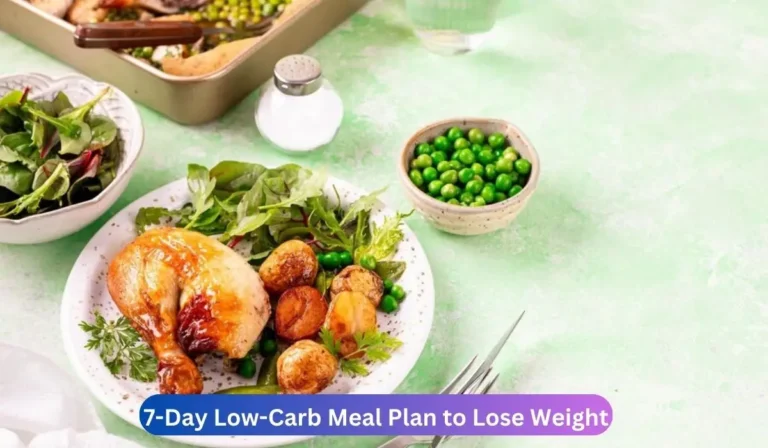Free Keto Diet Plan for Seniors: A Simple Guide to Healthier Living
The keto diet can be a great option for seniors looking to improve their health and well-being. A free keto diet plan tailored for seniors can help you manage weight, boost energy levels, and enhance mental clarity. Adapting this low-carb, high-fat diet to meet your specific needs is crucial for success and sustainability.
Planning your meals can simplify your journey into the keto lifestyle. With a variety of delicious options available, you can enjoy satisfying dishes while still prioritizing your health. Additionally, monitoring your health during this transition is essential to ensure it’s working for you.
Key Takeaways
- The keto diet can lead to improved health outcomes for seniors.
- Customizing your meal plan helps make the diet enjoyable and effective.
- Regular health monitoring ensures safety and progress in your keto journey.
Understanding the Keto Diet
The ketogenic diet is a low-carbohydrate, high-fat diet that can offer several health benefits tailored for seniors. Understanding how it works and its components can help you make informed choices for your dietary needs.
Ketosis and Its Benefits for Seniors
Ketosis is a metabolic state where your body burns fat for energy instead of carbohydrates. When you consume fewer carbs, your liver converts fat into ketones, which can fuel your brain and muscles.
For seniors, this can lead to weight loss, improved energy levels, and enhanced mental clarity. Some studies suggest that a ketogenic diet may also support better blood sugar control, which is important for preventing diabetes-related complications.
Additionally, a low-carb diet may help reduce inflammation. This is beneficial for managing chronic conditions common in older adults. Remember, it’s essential to consult with a healthcare provider before starting this diet.
Macronutrients in a Keto Diet
In a standard ketogenic diet, macronutrient ratios are significantly different compared to traditional diets. Typically, the breakdown is approximately:
- Fat: 70-75% of total daily calories
- Protein: 20-25% of total daily calories
- Carbohydrates: 5-10% of total daily calories
Focusing on healthy fats is vital. This includes foods like avocados, olive oil, and nuts. These provide essential fatty acids and nutrients.
Protein sources should be lean and can include fish, chicken, and legumes. Limiting carbs means avoiding sugar and refined grains. Instead, opt for non-starchy vegetables, which can offer fiber and essential vitamins without excess carbs.
Understanding these macronutrient needs can help you create balanced meals that fit within the ketogenic framework.
Customizing Keto for Seniors
Customizing a keto diet for seniors involves adjusting nutritional needs and considering physical activity levels. Tailoring these aspects ensures that the diet supports health and wellness effectively.
Adjusting for Nutritional Needs
As you age, your body’s nutritional requirements change. It is essential to adjust the macronutrient ratios in a keto diet to meet these needs. Generally, the recommended ratio is about 70% fats, 25% protein, and 5% carbohydrates.
Focus on high-quality fats such as avocados, olive oil, and nuts. Include sufficient protein to help maintain muscle mass, especially if you are sedentary. Aim for lean options like chicken, turkey, and fish.
Additionally, consider incorporating more fiber-rich vegetables. These can help with digestion and provide necessary vitamins and minerals. Ensure adequate hydration, as seniors may not feel thirsty even when their bodies need fluids.
Exercise and Physical Activity Considerations
Physical activity plays a vital role in supporting a keto diet for seniors. Regular exercise helps maintain muscle mass and improve overall health. You should aim for a mix of aerobic activities, strength training, and flexibility exercises.
Walking, swimming, or yoga can be great choices to stay active. For weight training, consider using resistance bands or light weights.
Pay attention to your energy levels, especially when starting the keto diet. You might feel fatigued initially, so adjust your activity accordingly. Listen to your body and increase activity gradually while focusing on staying active daily.
Sample Keto Meal Plan
A sample keto meal plan for seniors focuses on easy-to-prepare recipes and delicious snacks. This approach ensures that maintaining a low-carb lifestyle is both enjoyable and manageable.
Easy-to-Prepare Keto Recipes
You can create simple meals that fit a keto diet with minimal effort. Here’s a breakfast option: Scrambled Eggs with Spinach. Sauté fresh spinach in olive oil, add beaten eggs, and top with a sprinkle of cheddar cheese. This meal provides healthy fats and protein.
For lunch, a Tuna Salad is a great choice. Mix canned tuna with diced avocado, cucumber, and a dollop of mayonnaise. Serve it over a bed of lettuce for a light yet filling meal.
For dinner, consider Baked Chicken Breast. Marinate the chicken in olive oil and herbs before baking. Pair it with roasted Brussels sprouts and a small sweet potato to balance your meal.
Snacks and Hydration
Snacking is important to stay energized. Include hard-boiled eggs or sliced cucumbers with guacamole for a quick treat. Nuts, like almonds or walnuts, are also great for healthy fats and protein.
Hydration is essential. Water is the best choice, but you can enjoy herbal teas too. If you prefer flavored drinks, try sparkling water with lemon or lime for a refreshing twist.
Incorporating these easy recipes and effective snack options into your meal plan ensures a flavorful and satisfying keto experience.
Monitoring Health and Safety
Maintaining your health while following a keto diet is essential, especially for seniors. Regular check-ups and understanding potential side effects can help ensure your safety and well-being as you make dietary changes.
Regular Check-Ups and Blood Tests
Regular doctor’s visits are crucial. Schedule check-ups every three to six months to monitor your health status.
During these visits, ask for specific blood tests. Important tests include:
- Blood Sugar Levels: To monitor diabetes risk.
- Cholesterol Levels: Check LDL and HDL for heart health.
- Electrolyte Levels: Low-carb diets can cause imbalances.
Tracking these markers helps you understand how the keto diet affects your body. If you have existing health conditions, inform your doctor about your diet. They can guide adjustments as needed to ensure your health remains stable.
Recognizing and Managing Side Effects
As your body adjusts to the keto diet, you might experience side effects. Common issues include:
- Keto Flu: Symptoms like fatigue, nausea, or headaches can occur in the beginning. Stay hydrated and consider electrolyte supplements.
- Digestive Issues: Changes in diet may cause constipation. Increase fiber intake with low-carb vegetables or consider a fiber supplement.
- Muscle Cramps: Ensure sufficient hydration and sodium intake to avoid cramps.
If side effects persist or worsen, consult your healthcare provider. They can help determine whether dietary adjustments or medical interventions are necessary to maintain your health. Regular communication with your doctor is key to managing any concerns effectively.
Sustainable Practices for Long-Term Success
Choosing sustainable practices is key to maintaining the benefits of a keto diet over time. It requires commitment and adaptation to make keto a lasting part of your life. Here are some practical steps to help you succeed.
Making Keto a Lifestyle
To truly embrace the keto diet, shift your mindset from a temporary plan to a long-term lifestyle. Start by incorporating a variety of low-carb foods to keep meals interesting. Focus on whole foods like leafy greens, avocados, nuts, and quality proteins.
Meal prep can be a game changer. Set aside time each week to prepare your meals. This makes it easier to stick to your dietary goals.
You might also consider joining a community or group of like-minded individuals. This provides accountability and encouragement as you navigate your journey. Making keto a lifestyle means adapting to changes and celebrating small victories along the way.
Continued Learning and Support
Staying informed about the keto diet is essential for success. Read articles, watch videos, or attend workshops to deepen your understanding. Nutrition knowledge can help you make better food choices while on the keto plan.
Seek out support through online forums or local meet-ups. Sharing experiences with others can provide motivation and new ideas.
Regularly consult a healthcare professional, especially as you age. They can help you make necessary adjustments based on your health needs. This ongoing support ensures that you remain confident and informed on your keto journey.
FAQS About Free Keto Diet Plan for Seniors
As you explore a ketogenic diet plan, you may have specific questions that address common concerns for seniors. Understanding the best practices, nutritional needs, and meal planning options is essential to successfully adopting this lifestyle.
What are the best practices for seniors starting a ketogenic diet plan?
Start gradually by cutting back on carbohydrates while increasing healthy fats. Focus on whole foods like leafy greens, nuts, and avocados. Keep track of your macronutrient ratios to ensure you’re meeting your dietary goals.
How can a senior over 70 adapt a keto diet plan to meet their nutritional needs?
Incorporate a variety of nutrient-dense foods, such as lean proteins and low-carb vegetables. Ensure adequate hydration and consider supplementation, especially for vitamins D and B12. Pay attention to how your body responds and adjust portions as needed.
What are the ideal keto diet meal plan options for seniors aiming for weight loss?
Choose meals that are high in healthy fats and moderate in protein while keeping carbs low. Breakfast could include eggs and spinach cooked in olive oil. For lunch, consider a salad with avocado and grilled chicken. Dinner might feature baked salmon with steamed broccoli. Free Keto Diet Plan For Seniors
Which foods should be included in a keto diet for women over 50?
Women over 50 should focus on nutrient-rich foods such as omega-3 fatty fish, avocados, nuts, and seeds. Incorporating low-carb vegetables like zucchini and cauliflower is also beneficial. These foods support hormonal balance and overall health.
Is a ketogenic diet safe and beneficial for individuals aged 70 and above?
Many individuals in this age group can safely follow a ketogenic diet, provided they consult with a healthcare provider. The diet may help with weight management and improve metabolic health. Monitor any health changes, especially concerning heart health and kidney function. Free Keto Diet Plan For Seniors
How can seniors incorporate a ketogenic diet into their lifestyle without added expenses?
Plan meals using bulk and seasonal ingredients to save money. Focus on simple recipes that require minimal processing. Shopping at local markets or growing your own vegetables can also help reduce costs while maintaining a healthy diet.






